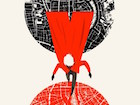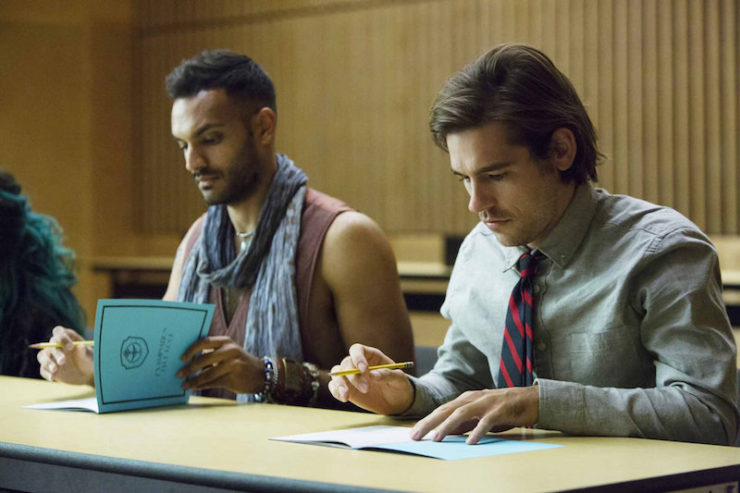“Does anybody seriously, seriously miss the House-Elf Liberation Front?”*
Down the street from the Jacob Javits Center, at the BookCon portion of New York Comic-Con, moderator and writer Alexandra Bracken (The Darkest Minds) talked to a panel of writers—Ezekiel Boone, Blake Crouch, Lev Grossman, Patrick Ness, and Sarvenaz Tash—about the sometimes emotional, sometimes fraught, sometimes illuminating process of turning books into movies and TV shows. Read on for some highlights from the panel!
Unsurprisingly, a lot of the conversation focused on the changes that are made in the adaptation process. “The author was very difficult,” Patrick Ness joked about adapting his own book, A Monster Calls, into a movie that opens this winter. His take is that it’s less of an adaptation and more of a remix: “The same song, in a different form.”
Blake Crouch, whose Wayward Pines books are the basis for the Fox television series of the same name, and Lev Grossman, on whose books Syfy’s The Magicians is based, both talked about how television eats through plot. Crouch said the first episode of Wayward Pines basically blew through the first half of the first book; Grossman said the first episode of The Magicians was about a third of book one. (“And I worked so hard on book one!” he mock-whined.)
The technical differences between writing novels and screenplays came up a bit. (Grossman: “Novels are just like [unintelligible groaning noise], you can just smear it all over the page. Screenplays, everything’s so precise.”) But the angle the authors came back to, in answer after answer, was the difference between what’s in writers’ and readers’ heads and what can practically work on the screen—when there’s a budget and a whole crew involved. “As a reader,” said screenwriter and YA novelist Sarvenaz Tash, “I almost always think I want the movie to be exactly like the book, but the truth is, I want it to be like the book in my head…. There’s no way a movie’s going to please every fan.”
“I became aware rapidly and semi-traumatically that writing novels is one of those media where the creator has so much control,” Grossman said. “You cast all the parts. You play all the parts yourself …. you dress all the sets, you do all the costumes, you coach all the writers in their line readings, because it’s all you.” Once a book moves into TV or movies, “there’s like four people whose job is only to figure out the clothes.”
“I discovered something about myself,” he added, “which is that I’m a control freak. It was a steep learning curve just figuring out how to collaborate.”
“When you’re sitting alone writing in your room, there’s no special effect budget. You can do whatever you want. I dropped a nuke on page 70!” said Ezekiel Boone, whose The Hatching is in development for TV. But in TV, when there are millions of dollars and hundreds of people involved, there’s a limit. And he’s pragmatic: “At the end of the day, really honestly, as long as it’s on TV or in the movies, really? I don’t care. I want it to be amazing, but I’ll take OK.”

Crouch, who has been through the adaptation process with Wayward Pines and is now the co-creator of the upcoming Good Behavior, spoke about the luck involved in having anything successfully adapted—and just how many people are involved in the production of a TV show. “I came away thinking [I have to] make sure this next thing I do is great, and it’s worthy of all the people who are coming to work every day.”
When Bracken asked if the writers had tried to manage fan expectations at all, answers varied. Crouch said he tried to let his readers know he’s OK with changes—though that doesn’t mean they have to also be OK with them.
Ness compared it to the question he sometimes gets about writing young adult fiction: does he ever feel he has to watch himself because of subject material? “Implicit in this,” he said, “is that if I didn’t have strictures I would just be writing filth and porn for teenagers! I’m a decent person. I’m going to write stories that I believe in. Hopefully the same is true of an adaptation.”
Grossman pointed out, “You do a lot of work when you read a book. All you’re given are these little crumbs, these tiny words, and using that, you create this entire world.” He was a big fan of Game of Thrones before the show, he said, and he worked hard on the Game of Thrones in his head: “My Game of Thrones was on fleek.”
Grossman said that when The Magicians came on, a lot of people pushed back against the liberties taken with the source material—liberties he had been familiar with for two years already. “But I remember how wrenching it was,” he said, “and I empathize.”
When asked if there had ever been changes made to their work that they liked, Crouch mentioned a character introduction that he wished he’d done in his book, Ness spoke about collaborating with A Monster Calls’ director on a different ending to the book, and Grossman cited the excellent casting of Arjun Gupta as a show-Penny, who is very different than book-Penny: “In the show, they cast a guy to play Penny who is so sexy, every day he chips away at my hard-won heterosexuality.”
An audience member asked about the adaptation of Ness’s Chaos Walking series. The books are about young teens, but 24-year-old Daisy Ridley has been cast. How do you balance that when the story hinges on the age of the character?
“Anything can work with suspension of disbelief,” Ness said. “I’m sort of OK with it about Chaos Walking. I love Daisy Ridley and I know who they’re talking about for Todd and that could really, really work. … Sometimes you do have to let go. It’s a very expensive movie and sometimes you have to make compromises to get real benefits elsewhere.”
He wouldn’t let slip any hints on the Todd casting front.
One of the last audience questions was about what’s next: When you’ve had work adapted, is there pressure to make your next project adaptable?
“My next book is a totally internal gay YA version of Mrs. Dalloway, so I’m gonna say no,” said Ness, with obvious delight.
* Patrick Ness does not miss the House-Elf Liberation Front.










